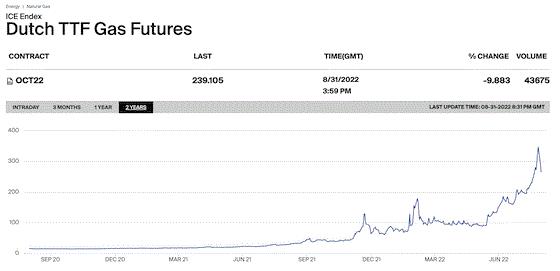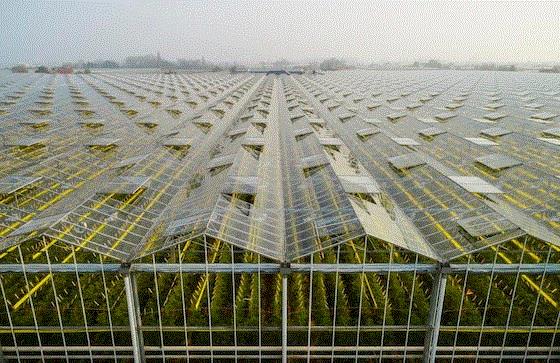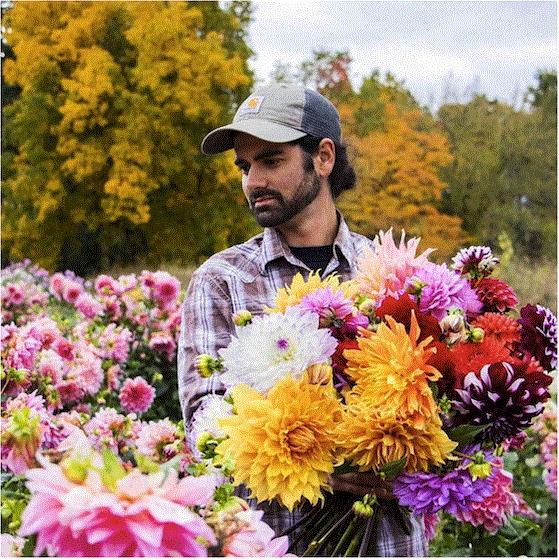Energy costs at crisis level for European growers
The mainstream media has been reporting on the energy crisis hitting Europe this summer and forecasting dire conditions this winter when it gets cold. But they haven’t mentioned our industry and what's happen due to incredibly high greenhouse heating costs.
I’ve been in touch with several Dutch colleagues to see what they have to say about the situation. Here are some details. If you can offer more clarity, or positive news or what-have-you, email me HERE.
First, natural gas prices: Bloomberg and others report that natural gas futures are 10 times higher than the average for this time of year. That equates to around $93 per MMBTU (or dekatherm) for wintertime gas. Someone likened it to oil being $500 a barrel! Compare that to the current U.S. futures price of around $9 per MMBTU—which is very high by our standards, seeing how we’ve been paying no more than about $4 since 2008.

Look at that climb. But at least it's taken a steep dip. Will it last? And will it come down to an affordable pre-war level?
The cause? Russia has curbed gas shipments in retaliation for Ukraine war sanctions and Norway’s gas supply is down due to maintenance. And in the U.S. a liquefied natural gas plant was damaged by an explosion earlier this year and is not expected to come back online until November.
“Europe simply doesn’t have access to enough alternative supplies to easily compensate for those Russian gas losses,” said Samantha Dart, Goldman Sachs Group Inc.’s head of natural gas research.
The Netherlands does have its own on-shore gas field, near the northern town of Groningen. However, seismic activity in that region—said to possibly be caused by gas production activities, has led officials to reduce gas production due to earthquake damage to 150,000 residences. There’s pressure to expand production if the crisis worsens, but some officials, including the Dutch mining minister, says safety should come before industry.
The situation is volatile to say the least; even while writing this, the news that the EU is ahead of its winter gas storage targets sent the futures price down as much considerably—from 346 euros per megawatt hour on August 26 to 240 euros on September 1. That’s some relief, but not nearly enough.

“Sharply shrinking production and impending bankruptcies”
That was how Wim van Marrewijk described the energy price situation in the piece below that I asked him to write. Wim wears at least five horticultural hats, including operational director of a large biodynamic indoor vegetable company; director of the organics consultancy Sustainable Botanics; and owner of Allura Ornamental Breeding, Biological Youngplants and Vena Vitae Benelux. This puts him close to what’s happening, he says.
Here is Wim’s take on the situation:
Energy-intensive crops are currently being hit hard to the exorbitantly increased energy costs for our sector. Energy prices have increased tenfold since September 2021; both natural gas (323.1 Euros/megawatt) and electricity (693.83 Euros/MWh) are endangering the Dutch greenhouse industry.
Growers who have secured their supply with long-term contracts are living with the insecurity of not knowing if they will get what they have purchased, as the EU has clearly directed that the volume of gas used by each member state has to decrease by 15%.
Geothermal heat is coming up, but operators are still facing many insecurities, as this is still a new area for greenhouses. Also, these projects are no longer subsidized by our government.

Altogether, we see that tomato growers will not start their artificially lighted tomato crops for this winter (decrease in production of 70% to 85% is expected), but also other crops, with winter chrysanthemum production expected to decrease by 35%.
Inflation has risen to above 10%, and consumers can’t afford higher prices for their food and flowers. The unwillingness of the big retailers to share in the increased energy costs is making the situation even worse. Especially in vegetables we know that retailers have no problem purchasing wherever they can do it the cheapest. Long-term survival of domestic supply seems not to be their focus.
Rabobank is calculating that 30% to 40% of existing greenhouse growers will get in financial difficulties. They are not prepared to help growers through the winter—which can be understood, seeing that energy prices are still increasing day by day and it’s not even winter.
LTO Nederland, an organization representing 35,000 Dutch farmers and horticulturists, has been asking our Dutch government for months to help growers by a state-guarantee on mortgages and loans, so growers can continue their operations, but so far no action has been taken.
Financial healthy and sustainable companies will be closed and are being punished by the Dutch Government for their huge investments in sustainable production. It’s another example that shows that there has been no clear vision by our government how our agricultural industry can move forward.
The industry will find solutions and survive, but many family-owned companies will be affected and disappear in the given situation. Production will decrease, food-safe production is in danger and even shortages can be expected this winter.
In flowers and potted plants, assortment will decrease and all will flow more and more to a warmer-weather peak season, which has never been good for prices.
This winter will show that not only our industry, but many others in Europe will struggle to survive, due to energy prices where oil companies are making the highest profits ever on energy.
(I allowed Wim to make that bit of an editorial statement about oil companies, even though I don’t know the facts of the situation.)

From Florensis
Another Dutch colleague who weighed in on the topic is Adriaan Vonk, Director of Domestic Production for distributor and young plant producer Florensis:
Energy prices in the Netherlands and Europe are sky high. This applies to gas and electricity. This means that for many products the costs no longer outweigh the profits. For vegetable cultivation, this means that this winter, hardly any vegetables will be grown under artificial light. Tomato and pepper growers, for example, will not start the season at the end of December, but will wait until February or March. Many growers of cut flowers will also leave their greenhouses totally or partially empty during the coming winter months.
The situation is very different depending on the business. Some purchased gas positions several years ago at low prices. This helps to get through the winter, while those who have hardly any gas positions must stop growing temporarily.
As an example. Florensis bought gas positions a few years ago for 2023 at a price of around 0.21 euros/m3 gas. Today, the price is 2.68 euros/m3.
Everyone hopes that within a few weeks prices will fall so that buying gas at reasonable prices will still be possible for next winter. This also applies to electricity. It is a very confusing time in our business.
Government subsidies would certainly help, but for now the government has no intention of doing so. And it is not just about horticulture; other industries are also struggling at the moment with the high energy prices. Consumers in the Netherlands are also paying much more for energy than in recent years. This in turn increases inflation. All in all, a very complex situation.
Thanks, Wim and Adriaan!
If you have insights into the European energy situation, weigh in HERE.

Meanwhile, in the U.S. …
As I was researching this story, I got a call from Mike Schaefer of Schaefer’s Greenhouses, just down the road from Ball in Montgomery, Illinois. Mike wanted to both vent and pick my brain about … natural gas prices. Great timing!
Mike said he'd just been discussing gas pricing and learned that his winter price was going to be 70 cents a therm ($7 per MMBTU or dekatherm). That freaked him out because last winter he paid just 29 cents a therm.
The Schaefers have a mixed bag of greenhouses, from 1940s lap glass to twin-wall polycarbonate to modern 2000-era Venlo glass, and they’ve gotten good at using energy curtains, wrapping them in plastic, shutting them down and employing other measures to be energy efficient. But still, even when his houses are empty, his insurance company requires he keep the heat at 55F to prevent snow damage.
“Can I afford to do this?” he said he’s asking himself about wintertime production—which, as a pot and bedding plant producer, starts with young plants in December and January. My advice, based on everything I’ve been hearing, was to lock in at 70 cents, as it could prove to be a bargain (although you should never take financial advice from a greenhouse trade journalist).
I told Mike I’d ask you what you're hearing about your winter gas prices. And more importantly, what are you doing to cope with them, assuming they’re as high as Mike’s. Let me know at beytes@growertalks.com.

Cannabis firm diversifies into veggies and flowers
I had to chuckle when I read an item forwarded from my resident cannabis expert, Dr. Brian Corr. It’s a press release from Aurora Cannabis of Edmonton, Alberta, Canada, stating that Aurora was diversifying into vegetable and flower young plants through the acquisition of a controlling interest (50.1%) of Bevo Farms, a Langley, British Columbia-based propagator and finished-plant producer.
The press release stated, “The transaction allows Aurora to immediately benefit from a profitable, cash flow-positive and growing business, and may have the potential to drive long-term value to Aurora's existing cannabis business via the application of Bevo’s industry-leading plant propagation expertise.”
Founded in 1986, Bevo produces plugs, liners, and finished bedding and potted plants for growers throughout North America. For their last fiscal year, Bevo had revenues of $39 million and earnings of $9 million. This deal is worth $45 million to Bevo, plus up to an additional $12 million based on achieving certain financial goals.
Aurora, meanwhile, has lost about CA$5.4 billion since its inception in 2006.
There’s another angle to the transaction: Bevo has agreed to purchase Aurora’s “Aurora Sky” greenhouse in Edmonton for the bargain price of CA$25 million. The 800,000-sq. ft. facility was built by Aurora in 2019 at a cost of CA$150 million (that’s $142.50 U.S. per sq. ft.!). This will give them a base in Alberta to “significantly expand” their market. Bevo will continue to be run by its existing management team, and their “robust” growth plan includes using Aurora Sky for orchid and vegetable propagation.
Aurora says it hopes to utilize Bevo’s propagation experience in the cannabis division.
Ironic, eh? Everybody was touting cannabis as the new frontier and the road to horticultural riches. How many growers left flower and tomato ranges for the gates and walls and security cameras of cannabis? And now they’re looking to US to finally help them pay the note on that ridiculously expensive greenhouse.

You can participate in Green Career Week
Mark your calendars for October 3-7 and take part in Seed Your Future’s new “Green Career Week” initiative. It’s designed to help YOU reach the next generation of horticultural professionals. You know, the ones who might be your next managers? Or buy the business from you when you're old and tired. Or even marry into the business!
Green Career Week is a national campaign led by industry professionals (like you) to increase awareness about green industry careers and help build relationships with local high schools.
Here’s how it works: During Green Career Week, participating businesses (again, that’s you) and organizations will connect with local high schools to showcase the various career paths at their business. Of course, you can reach out to schools anytime during the year—and Seed Your Future encourages you to do that—but by working together during a designated week, we can all give the industry a louder voice.
To get started, you first go to www.seedyourfuture.org/green-career-week. There, you register your business so they can track the number of participants and share that with the media, and also keep you posted on new tools and resources for your event.
Next, contact your local high school(s) asking if you can visit their school or if they can plan a field trip to your business. Seed Your Future has all you need to help plan such a visit—even things like minor child photo releases!
Then tell the local media about your involvement in Green Career Week.
And, finally, use social media to help make Green Career Week go viral.
You can sign up for all the resources at www.seedyourfuture.org/green-career-week.

Online retailers top furniture sellers list
If Laurie and I wanted to buy a piece of furniture, chances are good that we would visit a brick-and-mortar store in our area to kick the tires on that new sofa or lamp or what-have-you.
Which is why I was surprised to learn that the No. 1 and 2 furniture retailers in America are online businesses that have no brick-and-mortar presence—Amazon and Wayfair, at $11.2 billion and $7.8 billion respectively. Nos. 3 through 10 are all brick-and-mortar stores; No. 11 is Qurate, the parent company for “v-commerce” sellers QVC and HSN. No. 16 is the online retailer, Overstock. This I found in the weekly furniture industry publication Furniture Today.
Click HERE to read the full report.
Which I just did and I stand corrected—slightly. I just learned that both Wayfair and Overstock have built—or are considering—brick-and-mortar stores, with Wayfair launching a store called AllModern in Lynnfield, Massachusetts, and with plans for more stores under various Wayfair brand names. No stores yet from Overstock, but pundits say it’s only a matter of time.

Wayfair's new AllModern store in Massachusetts.
Hey, Amazon has grocery stores … how long before they have a department store … or nursery?

Future leaders wanted for Mastercourse Floriculture
Are you a young floriculture entrepreneur with big plans and big ideas who wants to learn from experienced executives and thought-leaders? Then sign up for Jungle Talks’ Pro Manager Mastercourse Floriculture. It’s a two-week trip in the Netherlands that will immerse you into the top level of floriculture. The class will take place January 16-27, 2023.
A a bonus, Jungle Talks has once again teamed up with the International Association of Horticultural Producers (AIPH) for the second “Young International Grower of the Year Award” during the IPM in Essen. The Mastercourse serves as the pre-selection for this award—meaning if you participate, you might just earn that coveted title!
How do you participate? They're looking for future floricultural leaders between the ages of 25 and 40 from around the globe, with a minimum of five years working experience in a leading position at a “future-proof producer of ornamentals.”
The Pro Manager Mastercourse partners with leading horticulture companies, including Koppert, Dümmen Orange, Ridder, Hortilux Schrèder, Logiqs, Lets Grow, Visser Horti Systems, Klasmann–Deilmann, HortiXS and Van Krimpen.
“We are very proud these leading companies and organizations work together to support and inspire this international group," said Ed Smit, co-founder of Jungle Talks. “These partnerships guarantee a high-level program and tour, and give participants ample opportunity to network at the CEO level with leading floricultural suppliers.”
More information on the program can be downloaded HERE, including the interactive registration form. To get a first impression, check out this VIDEO from a previous Mastercourse.
Interested? Act fast! Applications will be accepted until September 30 and just 15 applicants will be invited to participate (to keep the group intimate). Cost is 1,250 euros, which includes ground transportation, meals, entrance fees and professional guidance. Note that it doesn't including airfare to the Netherlands or hotels (but they’ve negotiated great rates!).
Questions? Contact Ed Smit, ed@jungletalks.com, or Renee Snijders, renee@jungletalks.com, or check out www.jungletalks.com.

Another $26K to help our future leaders!
In the days of ridiculous tuition (and controversial bailouts of same), it’s nice to see good, old-fashioned academic scholarships helping to fund the educations of the future employees, leaders and owners. That’s what the Southern Nursery Association has been doing since 1989 through its Sidney B. Meadows Fund, with a total of $602,000 in scholarship awards.
This year, an additional $26,000 has been awarded—$2,000 each to 13 students from seven southeastern U.S. universities. Here are the recipients:
- Ramsey Arram, North Carolina State University
- Forrest Brown, Virginia Tech—The Art & Millie Lancaster Scholarship
- Samuel de Bordes, Louisiana State University—The Dr. James & Faye Foret Scholarship
- Ashley Rene’ Edwards, Louisiana State University
- Landon Erbrick, Auburn University—The Sally Smith Scholarship
- Leandria Noelle Garrett, University of Georgia—The Robert L. Vanlandingham Scholarship
- Julian Ginori, University of Florida—The Richard J. Hackney Scholarship
- Johnathan Alexander Hampton, Auburn University—The Arthur A. “Buck” Jones Scholarship
- Carolyn Grace Krauss, University of Tennessee—The Dr. Bryson L. James Scholarship
- Thomas Maxwell McKeown, Louisiana State University—The Lee C. Howell Scholarship
- Luke Owen, North Carolina State University
- Kaitlin Swiantek, University of Georgia
- Jacob Logan Winkles, University of Georgia
Scholarship recipients are determined through a competitive application process, administered by a selection committee, based on academics, determination, demonstrated interest in the horticulture industry and financial need. Of the 13 students, 10 are graduate students and three are under-graduate.
“Congratulations to this exemplary group of students who have excelled academically and demonstrated determination and a passion for horticulture,” said Danny Summers, Executive Vice President of the fund. “We continue to hear from recipients how important these awards are in reducing their financial stress, allowing them the ability to concentrate more on their studies. I am confident each of these students will make an effective and positive contribution to our industry in the future. I look forward to seeing their accomplishments as they complete their studies.”
Interested in establishing a named scholarship to honor a loved one, past industry leader or company? It only requires a commitment of $30,000 with a minimum of $5,000 to begin and fulfillment over the next five years. Once established, a scholarship will be made annually in the designated name. Learn more at www.sbmsef.org or email info@sbmsef.org.

Field to Vase visits Michigan
You may recall that I’ve reported on two American Grown Flowers “Field to Vase” dinners Laurie and I have attended, one in Wisconsin and one in Alaska, and I can wholeheartedly recommend you try one yourself if you have the chance. Touring a flower farm and then dining in fine style amongst the flowers and under the twinkling lights with 150 or 200 like-minded flower enthusiasts … what’s not to like about that?!
Your next opportunity is in Oxford, Michigan, an hour north of Detroit, at Summer Dreams Farm, said to have “the most spectacular dahlia fields in America.” It’s slated for Sunday, September 18.

At Summer Dreams, you'll meet owner and dahlia expert Michael Genovese to learn about the 210-plus varieties he grows. You’ll enjoy a multi-course artisan meal, wine and craft beer. And your dinner experience will be a feast for the eyes, too, thanks to the innovative tablescapes featuring locally grown flowers designed by Derek Woodruff of Floral Underground.
Tickets are $300; you can also attend a floral design class with Derek for $75 (alas, the private farm tour with owner Michael has already sold out).
To learn more, click HERE and click on the Summer Dreams Farm box. Also check out the next Field to Vase Dinners at Arnosky Family Farms in Blanco, Texas, in October; and Fern Trust in Seville, Florida, in November.

Finally …
Even though you're reading a digital newsletter, print is NOT dead—it is whizzing by on the giant Heidelberg press at the frightening rate of 40,000 pages per hour, thanks to Schumann Printers of Fall River, Wisconsin, the fine folks who print GrowerTalks/Green Profit and all our many special supplements.

Recently, some of the GrowerTalks staff and I visited Schumann so the newbies could see the press in action and we made THIS video so you, too, could see what goes into printing a magazine—it’s pretty cool!
Green Profit managing editor Jen Polanz even found the red “STOP THE PRESSES!” button … but she had no call to mash it, as our September issue was looking just fine as it rolled down the line.
Feel free to email me at beytes@growertalks.com if you have ideas, comments or questions.
See you next time!

Chris Beytes
Editor
GrowerTalks and Green Profit
This e-mail received by 25,730 loyal readers!
Thanks to my loyal sponsors, who help me reach the 25,730 readers of Acres Online in more than 60 countries. Want to be one of them (a sponsor, that is)? Give Kim Brown a shout and she will tell you about our many advertising opportunities.